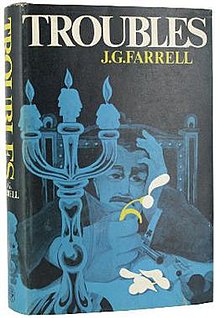Troubles (novel)

First edition
|
|
| Author | J. G. Farrell |
|---|---|
| Country | United Kingdom |
| Language | English |
| Publisher | Jonathan Cape |
|
Publication date
|
1970 |
| Media type | Print (hardcover) |
| Pages | 446 |
| ISBN | |
| Followed by | The Siege of Krishnapur |
Troubles is a 1970 novel by J. G. Farrell. The plot concerns the dilapidation of a once grand Irish hotel (the Majestic), in the midst of the political upheaval during the Irish War of Independence (1919–1921). It is the first instalment in Farrell's acclaimed 'Empire Trilogy', preceding The Siege of Krishnapur and The Singapore Grip. Although there are similar themes within the three novels (most notably that of the British Empire), they do not form a sequence of storytelling.
Troubles was well-received upon its publication. It won the Geoffrey Faber Memorial Prize and, later, the Lost Man Booker Prize. It was adapted into a made-for-television film in 1988, starring Ian Charleson and Ian Richardson.
In 2010, Sam Jordison in The Guardian called Troubles "a work of genius", and "one of the best books" of the second half of the twentieth century. "Had [Farrell] not sadly died so young,” Salman Rushdie said in 2008, "there is no question that he would today be one of the really major novelists of the English language. The three novels that he did leave are all in their different way extraordinary."
The novel concerns the arrival of Englishman Major Brendan Archer, recently discharged from the British Army, at the Majestic Hotel on the Wexford coast in south-east Ireland in 1919. Both the hotel, and the town in which it is situated, Kilnalough, are fictional. Archer is convinced he is engaged, though sure he had never actually proposed, to Angela Spencer, the daughter of Edward Spencer, the elderly owner of the hotel. She has written to him since they met in 1916 while on leave from the trench warfare of the Western Front.
The Spencers are an Anglo-Irish Protestant family, strongly Unionist in their attitudes towards Ireland's ties to the United Kingdom. Archer functions as a confused observer of the dysfunctional Spencer family, representing the Anglo-Irish, and the local Catholic population. As the novel progresses, social and economic relationships break down, mirrored by the gentle decay of the hotel.
...
Wikipedia
